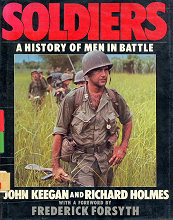
KEEGAN – HOLMES : Soldiers : a history of men in battle (fülszöveg)
Soldiers—warriors who fight for pay—are latecomers to the field of human conflict, though warriors go back as far as human society itself. In this evocative history of men in battle, John Keegan and Richard Holmes explore the ways in which warriors became soldiers and how that process has shaped the world we live in.
The central focus of Soldiers is on the exact nature of the experience of battle in all its variants—as known by infantryman, cavalry, tankman, gunner, sapper, aircrew, casualty, irregular, and commander. The authors show how the earliest warrior types developed; how the driven, then ridden, horse and the evolution of cavalry transformed the nature of battle; how artillery brought down the fortified castles of feudal Europe, how in turn "bastion forts" developed, and then how the techniques of offensive siege engineering empowered assaulting armies with the means to challenge them.
The primacy of the infantryman declined in the late eighteenth century; the new firearms of the mid-nineteenth century, rifled and furnished with magazines, finally eroded his battle-winning capacities. By 1914 it was clear that the era of the primacy of man in warfare was drawing to a close and the primacy of the machine was at hand.
Tanks, tactical aircraft, self-propelled artillery, motorized infantry—these invested military operations with a speed and reach not seen since the raids of Genghis Khan. But warfare is too crude and brutal a medium of human relationship to be revolutionized by mere technical ingenuity. After the renaissance of irregular forces during the Second World War—commandos, parachutists, long-range penetration units, subversive teams, guerrillas—Western powers mobilized these irregular techniques against revolutionary nationalists in the remnants of their empires, but this effort has been mostly unsuccessful.
Meanwhile, the rise of military air power increased the exposure of civilians to the experience of war. It is one of the strong points of this extraordinarily compassionate book that it makes so memorably clear that hardship and suffering, among both civilians and soldiers, are inseparable from the human experience of war. In wars fought to a decisive conclusion, costs almost always outweigh benefits, and such costs are measured in death, wounds, and terrible human pain; in understanding military history, it is therefore also essential to grasp the importance of an army's medical service, for it is as important to a soldier as his weapons or his leaders.
How soldiers are motivated to combat is the subject of Keegan and Holmes's concluding treatment of "fighting spirit." Ultimately, they argue, such motivation is the responsibility of the commander, whose selection, training, and character are key determinants in the success or failure of men in battle.